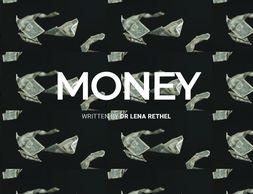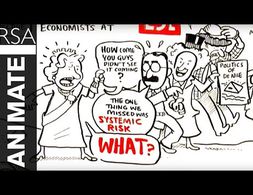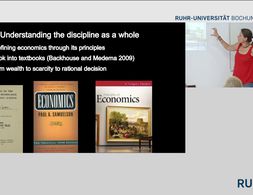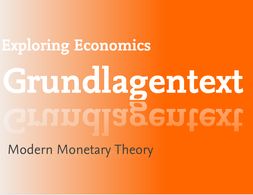749 Ergebnisse
This dossier gives an overview of the functions and the nature of money. The concept of Islamic finance is briefly explored, too.
David Harvey illustrates the five most common narratives on why the financial and economic crisis took place – from human frailty to policy failure.
First some properties about the Sum of squared residuals and the linear regression function are restated. In particular three properties that an ideal fitted regression line must fulfill are discussed. Then, the R squared is defined using the measures of the Sum of squared residuals, the total sum of squares and the sum of explained squares.
In this keynote speech, Roger Backhouse gives a historical overview of theories on secular stagnation: how it evolved from a description of the economic situation, especially in the U.S. of the 1930s to an analytical tool and then lost importance until its current revival. Backhouse touches upon the contributions of J. A. Hobson, Alvin Hansen, Evsey Domar and Paul Samuelson.
Welche Finanzregulierungen gab und gibt es in der Europäischen Union seit der Finanzkrise? Der Vortrag gibt einen Überblick über verschiedene Regulierungen, diskutiert das Problem „too big to fail“, den Einheitlichen Bankenaufsichtsmechanismus und Interessenskonflikte zwischen der Europäischen Zentralbank und der Europäischen Bankenaufsichtsbehörde.
This multimedia dossier is part of the series „Understanding Finance“ by Finance Watch. The dossier focuses on universal banks – banks that pursue commercial and investment banking and points out several problems of those megabanks, especially in the context of the financial crisis (too big to fail).
Ein philosophischer Blick auf die Grundlagen internationaler Ökonomie Jakob Kapeller Quelle van Treeck Till and Janina Urban Wirtschaft neu denken Blinde Flecken in der Lehrbuchökonomie iRights Media 2016 Das Buch kann hier bestellt werden http irights media de publikationen wirtschaft neu denken Rezensiertes Buch Krugman P R Obstfeld M Melitz …
Verkehrte Welt in Sachen Fiskalpolitik Offener Mainstream und dogmatische Heterodoxie in Standardlehrbüchern der Volkswirtschaftslehre Achim Truger Quelle van Treeck Till and Janina Urban Wirtschaft neu denken Blinde Flecken in der Lehrbuchökonomie iRights Media 2016 Das Buch kann hier bestellt werden http irights media de publikationen wirtschaft neu denken Rezensierte Bücher …
Der große Zwiespalt zwischen Effizienz und Gerechtigkeit Realität oder Ideologie Till van Treeck Quelle van Treeck Till and Janina Urban Wirtschaft neu denken Blinde Flecken in der Lehrbuchökonomie iRights Media 2016 Das Buch kann hier bestellt werden http irights media de publikationen wirtschaft neu denken Rezensierte Bücher Mankiw N G …
Fortgeschrittene Makroökonomie Lehrbücher mit Tunnelblick Über die Enge der DSGE Modellwelt Sebastian Dullien Quelle van Treeck Till and Janina Urban Wirtschaft neu denken Blinde Flecken in der Lehrbuchökonomie iRights Media 2016 Das Buch kann hier bestellt werden http irights media de publikationen wirtschaft neu denken Rezensierte Bücher Walsh C E …
The page "Positive Money" gathers text and short videos which explain how money is created by banks by giving loans. It furthermore presents the consequences of this process on housing prices, inequality and the environment and its role in the financial crisis. The dossier is provided by the campaign "Positive Money" which aims at a democratic control over money creation. Besides texts by the campaign, the page makes available links to journal and conference articles on the topic. The page focuses on the banking system of the UK.
Irene van Staveren, professor of pluralist development economics, presents her pluralist teaching method for the introductory level. Based on her textbook “Economics After the Crisis: An Introduction to Economics from a Pluralist and Global Perspective” she suggests to focus on real-world problems and pari passu apply economic theories such as Social economics, Institutional economics, Post-Keynesian economics as well as Neoclassical economics without wasting time to single out the latter. Besides pointing out advantages of such a pluralist method Irene illustrates her approach based on interesting topics such as growth or feminist economics.
In this lecture, Beatrice Cherrier explains why it is worth to research the history of JEL codes. The changing relationship between theory and application and the rise and death of new economic topics in the XXth century through the successive revisions of the classification system economists use to publish, recruit and navigate their discipline.
At the 2013 Climate, Mind, & Behavior Symposium, Rebecca Adamson of First Peoples Worldwide illustrates alternative economic systems modeled after indigenous worldviews and the power they have in pushing us towards a more sustainable existence.
Das globale Wirtschaftssystem bringt durch die Übernutzung der globalen Ressourcen und die Verschmutzung der Umwelt lebenswichtige Funktionen des Erdsystems in Gefahr. Dieser Artikel diskutiert Vorschläge einer grünen Ökonomie zu Lösung dieser ökologischen Krise und erläutert verschiedene Aspekte einer Kritik daran.
Jede Finanzkrise ist in erster Linie eine Schuldenkrise. Schuldner_innen nehmen zu viele Kredite auf, die sie dann nicht mehr bedienen können. Gläubiger_innen – vor allem Banken – müssen in der Folge ihre Forderungen abschreiben und vergeben weniger Kredite. Die Finanzkrise ist da.
Um eine solche Finanzkrise wirklich zu verstehen, muss man aber erst begreifen, wie Kredite eigentlich entstehen und wie genau Banken und andere Finanzinstitutionen funktionieren. Aufgabe einführender Bücher in die Volkswirtschaftslehre sollte sein, diese fundamentalen Zusammenhänge darzustellen. Leider stellen diese Bücher das Finanzsystem und die Kreditschöpfung meist falsch dar. Das erschwert sowohl die Analyse einer Finanzkrise als auch Wege zu ihrer Lösung zu finden.
This essay draws on several analyses on the gender impact of the recession and of austerity policies, in which authors acknowledge a threat to women’s labour market integration and a potential backlash to traditional gender labour structures. We contribute to that literature by asking whether recession and austerity convey a gender effect on educational attainment. Our aim in this essay is to portray the likely effects of austerity measures on gender equality with a focus on women’s participation in tertiary education and to hypothesize the implications of these scenarios for labour market effects, to be tested in future empirical research.
Based on Modern Money Theory (MMT), Stephanie Kelton compares the cryptocurrency to the fiat money system (or simply what we have today).
In order to describe the global structure of the monetary and financial system and its effects on the global economy, most economics textbooks rely on unappropriated theories that provide nothing but outdated descriptions. In this talk, key speakers in economics, economic history and banking try to make this complex system a little more understandable by relying on real-world insights.
In this post, Rethinking Economics sets out what it means to decolonise economics education and how we can do that. The article first breaks decolonising down into a "mind-set" and a "process", then applies this process to economics education. It finishes with a reading list and some suggested actions to get you started decolonising economics today.
This panel discusses the role of mathematics and history in economics. Lord Robert Skidelsky and Dr. Ha-Joon Chang advocate for a more prominent role of history and a less prominent role of mathematics within economics. Prof. Steve Pisckhe and Prof. Francesco Caselli defend the dominant role of mathematics within economics. Each of the speakers gives a 10-15 minutes talk advocating his position, before the panel is opened up for Q&A. The discussion is moderated by Prof. James Foreman-Peck.
Due to the economic crisis of 2008/2009, households faced drastic decreases in their incomes, the availability of jobs. Additionally, the structure of the labour market changed, while austerity measures and public spending cuts left households with less support and safeguards provided by the state. How have these developments affected the burden of unpaid labour and what influence did this have on gender relations?
This article explores if power dynamics in the household can be changed, and if so, how. In this context the focus is laid on government childcare policy and its various channels of possible influence.
Die Modern Monetary Theory (kurz: MMT, dt: moderne Geldtheorie) ist eine geldtheoretische und makroökonomische Denkschule, bei der es hauptsächlich um die Analyse des Geld- und Kreditsystems und insbesondere um die Frage der Kreditschöpfung geht.
This essay deals with the concepts of Sustainable Land Management (SLM) and Land Degradation Neutrality (LDN).
In der Diskussion um ein bedingungsloses Grundeinkommen (bGE) erscheint es als Idee „ohne Ideologie“, das über unterschiedliche politische Lager hinweg befürwortet wird. Das täuscht. Wenn wir nicht anfangen, unter der Vielzahl an Vorschlägen zu unterscheiden und nur über die abstrakte „Idee“ diskutieren, spielen wir neoliberalem Denken in die Hände, das Grundeinkommen für die Erhaltung sozialer Ungerechtigkeit instrumentalisiert. Die jüngste Debatte um ein „solidarisches Grundeinkommen“ zeigt: Der positiv belegte Begriff ist längst gekapert – wo „Grundeinkommen“ drauf steht, kann inzwischen alles mögliche drin sein.
Welche Rolle können Zentralbanken, staatliche Banken wie KfW und EIB und private Finanzwirtschaft spielen, um den anstehenden Umbau voranzubringen? Müssen Zentralbanken eingreifen, wenn Politik versagt?
Andrew McAfee about the history of human progress and the modern uncoupling of our prosperity from resource consumption. They discuss the pitfalls and hidden virtues of capitalism, technological progress, environmental policy, the future of the developing world, and other topics.
The authors discuss how identity affects economic outcomes by bringing together psychological and sociological perspectives and economics. For economic outcomes of a single individual, it might be interesting which kind of social groups this individual belongs to. This may influence individual daily decisions and hence economic outcomes. It can, however, not only affect individual economic outcomes but also economic outcomes of organizations, institutions and other groups. This paper describes these influences with respect to gender in the workplace, to the economics of poverty and social exclusion, and to the household division of labour.
James Robinson gives in this talk a short introduction into the theory and ideas of his popular book "Why Nations Fail" which was published together with D. Acemoglu in 2012. With many real-life examples he gives a lively description on the fundamentals for economic success from an institutionalist view. According to Robinson, the nature of institutions is a crucial factor for economic success. Whether institutions are inclusive (such as in prosperous economies) or extractive (poor economies) stems from the nation's political process and the distribution of political power.
How can we establish new institutions and practices in order to use fare-free public transport as a beacon for sustainable mobility and a low-carbon lifestyle? The author of this essay elaborates on how practice theory and institutional economics can help to answer this question.
Fragen über den Zweck, die Struktur und den Inhalt des wirtschaftswissenschaftlichen Curriculums sie sind so alt wie die Disziplin selbst. Ein prominentes deutsches Beispiel ist der vor mehr als 100 Jahren ausgefochtene Werturteilsfreiheitsstreit. Das öffentliche kritische Interesse an den Wirtschaftswissenschaften korreliert mit den Krisen des Systems. Aus dieser Warte gesehen ist es nicht verwunderlich, dass sich nach der großen Finanzkrise in den Nuller Jahren dieses Jahrhunderts vermehrt kritische Stimmen zu Wort melden.
Wir nutzen Cookies. Klicke auf "Akzeptieren" um uns dabei zu helfen, Exploring Economics immer besser zu machen!





























